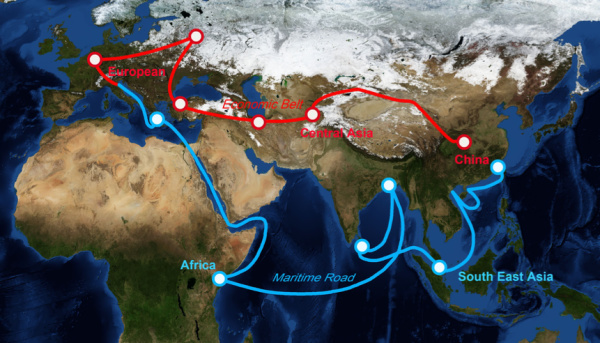The Middle Corridor and the Russia-Ukraine War: the Rise of New Regional Collaboration in Eurasia?
By Selçuk Çolakoğlu
January 31, 2023
After Russia’s invasion of Ukraine, the West‑led sanctions regime against Russia, coupled with Russian counter-sanctions, has affected everything from energy resources and logistics to banking transactions and customs procedures. Western countries have realized that Moscow can weaponize its geopolitical position and logistic networks. Strategic over‑dependence on Russia’s energy, markets, and logistics has created significant challenges to neighboring countries due to increasing political tensions between the West and Russia. This development is undermining the Northern (Russian) Corridor’s position as the main overland East-West corridor. In turn, the alternative Middle Corridor is currently facing its best opportunity ever to take a leading position in connecting Europe and Asia.

EU–China trade to bolster security in the South Caucasus
By Boris Ajeganov
January 23, 2017, the CACI Analyst
Foreign investment in Georgia is strengthening the country’s importance in connecting East Asia with Europe, which has positive implications for the broader region. The rise in FDI in commercial and transportation infrastructure in combination with the signing of international free trade agreements will reduce Georgia’s vulnerability in terms of economic and, ultimately, ‘hard’ security. The growing importance of the South Caucasus as node for EU-China trade will weaken Russia’s incentives to undermine its southern neighbors by military, political, and economic means as it has done in the past. Accordingly, Tbilisi’s ability to conduct an independent foreign policy is set to improve despite the absence of Western security guarantees.
Prospects of Turkmenistan-Iran gas cooperation
By Dmitry Shlapentokh
October 12th, 2016, The CACI Analyst
On June 8, 2016, FSU Oil & Gas Monitor quoted former UK Energy Minister Charles Hendry as saying that gas from Turkmenistan could reach European markets by various different means, including “overland routes through Iran.” It is unlikely that Hendry would make such an announcement without having received encouraging signals from both Tehran and Ashkhabad. The prospect of gas deliveries from Turkmenistan to European markets is disconcerting for Moscow, which regards the monopolization of gas supply to Europe as one of its major geopolitical and geoeconomic goals.
EU's Southern Gas Corridor still lacks strategic approach
By Najia Badykova
March 30th, 2016, The CACI Analyst
On February 29, 2016, the Southern Gas Corridor Advisory Council met in Baku for the second time and asserted that the diversification of EU energy sources remains a key component of the Union’s energy security policy. But the project faces serious hurdles. After many years of discussions with potential gas suppliers, Brussels has only been able to secure 10 billion cubic meters (bcm) of Azerbaijani gas per year for the corridor, a tiny fraction of EU members’ needs. Without securing significantly larger new gas supplies, it will be difficult economically and politically to justify such a large and expensive infrastructure project. While EU officials continue to assert their commitment to the corridor, it is unclear whether Brussels is moving toward the pragmatic approach necessary to secure more gas for the scheme or if we are only witnessing further rhetoric from bureaucrats.
Russia's missile launches and the militarization of the Caspian Sea
By Huseyn Aliyev, Emil A. Souleimanov
November 23rd, 2015, The CACI Analyst
In early October, Russia's Minister of Defense Sergei Shoigu announced that Russian navy warships based in the Caspian Sea had fired a total of 26 missiles at the positions of the terrorist organization calling itself the Islamic State (ISIS) in Syria. The minister claimed that all the 11 targets, located around 1,500 kilometers from the warships, were destroyed over two days. Russian authorities and pro-regime media have considered the strikes a big success. While information soon resurfaced that some cruise missiles had landed on Iranian soil, the fact that the October strike is definite proof of the failed attempts to turn the landlocked water basin into a demilitarized zone has received less attention.






